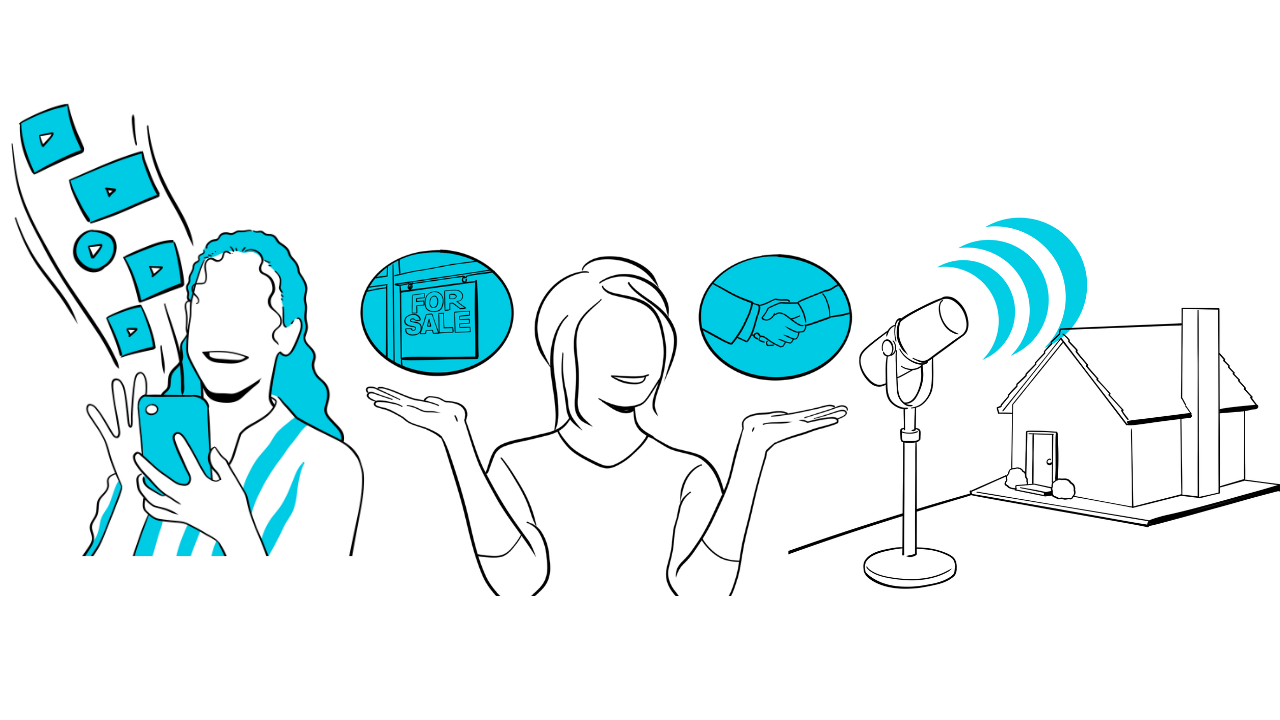We’ve all been there. You arrive at a listing presentation, confident and ready to sell the clients on working with you.
You think everything is going well until you get to the close — and suddenly, the homeowners come up with some reason they can’t list with you right then and there.
It’s beyond frustrating, and if you don’t know how to overcome common objections, you could miss out on a lot of listings.
This isn’t just a problem for new agents — even experienced top earners struggle with tough objections. They just have more sales opportunities, more case studies, and generally more confidence to overcome hesitations.
I’ve met lots of amazing agents, and very few of them can work “miracles” and win “impossible-to-get” listings. So stop beating yourself up (and be thankful you won’t have to work with clients who would likely give you a headache).
Instead, focus on the objections you can overcome and become more confident in overcoming them. In today’s blog, I’ll give you the tools to improve your approach.
The number one way to handle objections is to reduce the odds of them ever coming up in the first place.
How can you do that?
Always try to “oversell” the seller on listing with you. You’re always better overselling than underselling. People who are undersold often change their minds, throw out objections or delay making decisions.
If you think someone is ready to list with you, don’t stop your presentation.
Instead, use a trial close to make sure they’re ready to list with you. A few good trial closes are:
- “Does this sound like what you’re looking for?”
- “Are you ready to move forward today?”
- “If I can get you what you want, do you want to move forward today?”
Use every tool at your disposal to “oversell” the seller. Here are some examples:
- Give the seller your book as soon as you walk through the door.
- Whenever you talk about something, reference it in your book. (I recommend bringing a second copy with post-it notes on the pages with your talking points.)
- Use a Powerpoint or Flipchart listing presentation.
- Show the seller case studies and/or lists of other homes you/your company have sold.
- Build rapport as soon as you walk through the front door.
- Use the assumptive close.
Talk about how your marketing will generate more buyer interest so the sellers get a higher price. If you can demonstrate how you’ll get the homeowners both, you’ll separate yourself from agents who only talk about how many homes they’ve sold.
Practice your presentation until you’re amazing at it. After all, practice makes perfect.
Sell yourself 100%, and it will be easier to sell others on how great you are. Sales is the transference of belief from one party to the other. If you don’t believe in what you’re selling, neither will the sellers.
One of the best ways to sell yourself on the value you provide is to go through all of your successful case studies. Look at the homes you sold that other agents couldn’t sell. Look at the homes you sold for a record high price. When you reflect on your successes, you’ll realize the value you bring to the table.
Stop the negative self talk and focus on positive self talk. Tell yourself, “I’m the best Realtor in my town,” “I sell homes for top dollar,” “Sellers want to hire me,” etc. Yes, I know this sounds arrogant and almost like magical “voodoo.” But, it works.
If a seller is resistant, tell them they can fire you at any time if they change their mind. I’ve won lots of listings because I was willing to do that. And in today’s review-driven real estate environment, you’d probably allow a seller to cancel at any time anyways. It’s not like you’re really losing anything.
Practice handling objections. The mere act of practicing objections reduces the likelihood of them ever coming up. I know this sounds strange, but it’s true. Confidence can prevent people from voicing their hesitations.
How to handle specific objections:
Objection: “I want to think about it.”
When someone voices that objection, what they’re really saying is: “I’m not 100% convinced that you’re the right agent to hire.” In that situation, you want to identify what is holding them back, address it, and then ask for the sale again.
How to address it: “I’ve shown you how I can market your home to attract more buyers and sell it for more money. What’s specifically stopping you from moving forward with me today?”
Usually, the seller will voice their specific objection or hesitation. Then you can address it and ask for the listing again.
Objection: “We want to pray about it.”
This is basically the same objection as the one above. There are a few different ways to address it.
If you’re comfortable doing so, offer to pray with them. Most clients who use this objection will be swayed by your willingness to relate to them and appeal to their beliefs.
Otherwise, you can use the objection handler above to see if there is anything stopping them from listing with you.
How to address it: “You want to pray about it? Then let’s pray.” Start your prayer out loud, go through it, and finish it. “OK, ____, I’ve shown you how I can market your home to attract more buyers and sell it for more money. Will you list your home with me today?”
Objection: I want to find my next house before I put this one on the market.
How to address it: “You know, ________, this sounds like a great way to sell your home and buy your next one. But, do you want to risk losing out on your perfect dream home?”
Pause and wait for the seller to say “No.” Then continue below.
“Here’s the problem with finding your next house first. As you know, it’s probably going to be a really great house. And because it’s great, lots of other people will be interested in it, which means the sellers will be able to pick and choose which offer they want to accept.
“And if you were that seller, which offer would you want to accept? An offer from a seller who hasn’t even listed their house, or an offer from a seller whose house is sold and who has everything lined up to buy your home? You’d probably take the offer from the seller whose house is sold, and the person selling your home probably feels the same way. So let’s get your home on the market, get it under contract, and then I’ll go to work to find the perfect home for you. Let’s move forward and get started today.”
Then, just assume they want to move forward and continue.
Objection: Another agent told me they can get me a higher price.
Remember that you can always ask for price reductions in the future. If the seller is insistent on a higher price, tell them you’ll list it at that price but warn them that you don’t think it’s realistic. Let them know that some agents just tell you the highest price to get you to sign with them, but they rarely actually deliver.
How to address it: “We can list your home at that price, but I want you to be aware that I believe that price is too high for this area. I worry your home won’t be seen by the right buyers if it’s listed at an unrealistic price point, but we can start there and see how it goes if you’d like.”
Objection: Have you sold any homes in this area/neighborhood?
Agents often run into these objections with sellers in a high-end area when they don’t have an established track record there.
How to address it: “No, I have not sold any homes in this area. But, that’s exactly why you should hire me. Let me explain. You see, I work with a lot of people who are selling a lower priced home who will then be buying a home like yours, which means I’m going to be working with more buyers than an agent who works exclusively in this area. Does that make sense?”
Wait for them to say “Yes” and then ask for the listing.
Objection: I’m going to sell it myself.
Most people have no idea how much work it takes to sell a home — especially for top dollar.
How to address it: “I can appreciate that. And on the surface it really looks like you can sell your home yourself and save a lot of money. It sounds like you really just want the most money in your pocket, is that right?”
Pause and wait for the seller to say “Yes.” Then continue: “And that’s exactly why you should hire me. I’ve shown you how I can market your home to attract more buyers and sell it for more money. My strategies will make your home sell for 2-3% more money, save you over 100 hours of work, keep you safe, and make the whole process much more seamless. I NET you the same amount of money and save you over 100 hours of time. Based on that, will you list your home with me today?”
Objection: Your commission is too high.
How to address it: “I agree there are a lot of desperate agents out there who will happily drop their commission. And I’ve shown you how I will market your home to attract more buyers and sell it for 2-3% more money. So, you will NET more money with me. Can I show you why?
Pause and wait for the seller to say “Yes.” Then continue: “Here’s why I’ll NET you more money. Not only will I do a better job marketing your home and attract more buyers, but I’ll also fight for you. I’ll fight to get you the highest price and the best terms. Do you really think those agents who were so quick to fold with you will fight for you when a buyer wants to get a better deal?”
Pause and wait for the seller to say “No.” Then continue: “That’s why you need me. Let’s get started today.”
Another great way to combat this objection is by showing the seller how much money they will save by selling faster. Check out how Rusty handles questions about his commission rate.
Objection: I have a friend in the business.
If the seller has met with you, then they aren’t “dead set” on hiring the friend. In my experience, this is usually a smokescreen objection the seller is using to try and get rid of you. So don’t get flustered. Here are some different ways to handle it:
1. Ask if they want to mix business and friendship.
It's never a good idea to work with someone you know when there’s a lot of money at stake.
How to address it: “I have a lot of friends in the real estate business, too, which is why when I look to hire someone, I look for the best. Obviously, you chose to interview me because you want to get your home sold for the most money possible. That’s what you want, isn’t it?”
2. Offer a referral fee to their friend.
This can allow the owner to hire you and feel good about not working with their friend.
When you offer this and remind them that mixing business and friendship can be difficult, it works a lot of the time.
How to address it: “I have a lot of friends in the real estate business, too, which is why when I look to hire someone, I look for the best. Obviously, you chose to interview me because you want to get your home sold for the most money possible. That’s what you want, isn’t it?”
Pause and wait for the seller to say “Yes.” Then continue: “I’ve shown you how I can market your home to attract more buyers and sell it for more money. Your friend wants what’s best for you, and I’ll call and give them the news. Let’s get started today.”
Objection: We need to interview more agents before we decide who to hire.
When someone voices that objection, what they’re really saying is: “I’m not 100% convinced that you’re the right agent to hire.” In that situation, you want to identify what is holding them back, address it, and then ask for the sale again.
How to address it: “___ I can appreciate that. And I’ve already done that for you. I shopped all the best agents in the area and compared what they do to what I do. And you know what was surprising to me?”
Pause and wait for the seller to say “No.” Then continue: “None of those Realtors took marketing as seriously as I do. And that’s why I’m going to get you top dollar. Which leads me to believe that somewhere along the way, I haven’t convinced you 100% that I can get you top dollar. So, what specifically is stopping you from moving forward with me today?”
Usually the seller will voice their specific objection. You can then address it and ask for the listing again.
Final Thoughts
Overcoming objections is about making a decision to become the best. Set a goal and then start working on it. Real estate is one of the best businesses in the world — if not the best. Where else can you make more money than a dentist, without going to 12 years of school, without being trapped inside people’s mouths all day, and without the risk or overhead a dentist has to deal with?
You decided to get into this business because you realized how awesome it is. So you might as well get really good at it and crush it!


.png)




